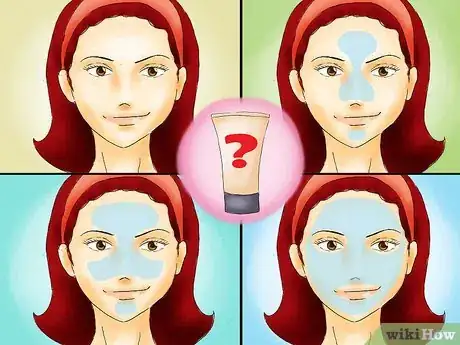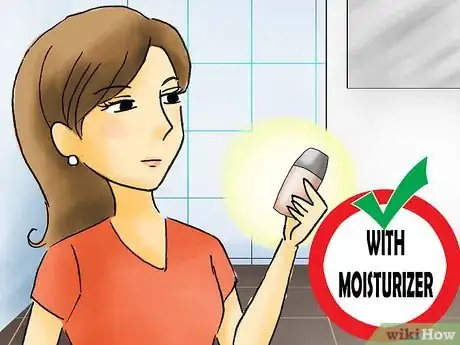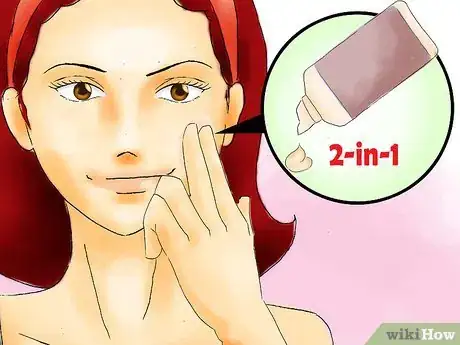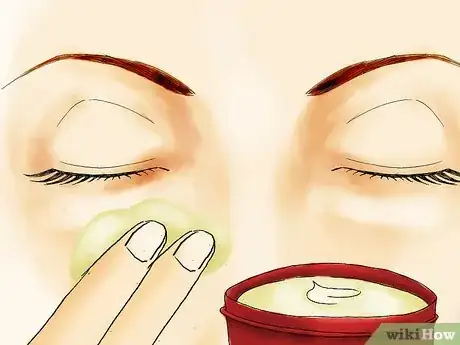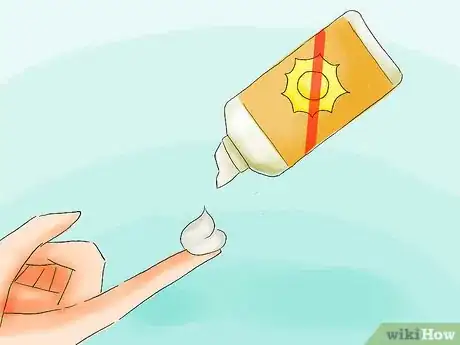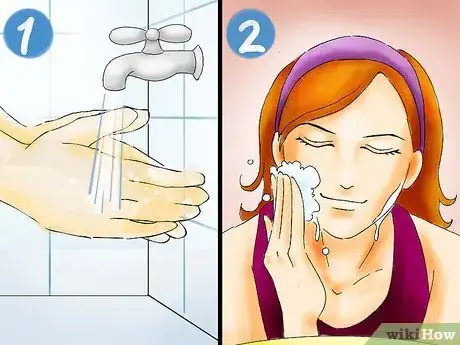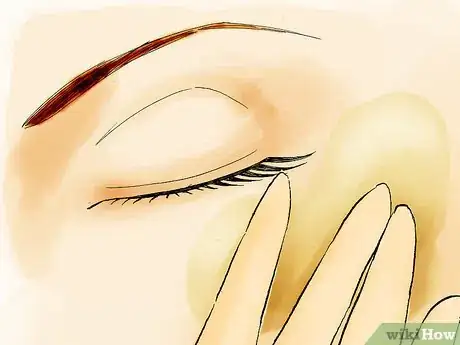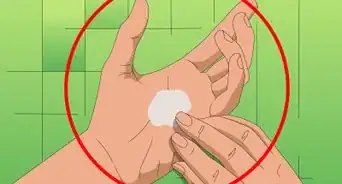This article was co-authored by Daniel Vann. Daniel Vann is the Creative Director for Daredevil Cosmetics, a makeup studio in the Seattle Area. He has been working in the cosmetics industry for over 15 years and is currently a licensed aesthetician and makeup educator.
This article has been viewed 72,803 times.
Moisturizer prevents your foundation from looking caked-on, and keeps your skin healthy underneath your makeup. Choosing the right moisturizer depends on your skin type as well as on the other products you are using.
Steps
Choosing a Moisturizer
-
1Choose a moisturizer appropriate for your skin type. You can get moisturizer oil-free, extra heavy, or anywhere in between. Oil-free or light moisturizers are best for people with oily, combination, or normal skin. Heavier moisturizers are often necessary for dry skin, but they can be a slippery base for makeup.[1]
- Heavy moisturizers add a dewy effect to your appearance. Avoid using dewy foundation on top of that, which can overdo it.
- You don't need to use the same moisturizer across your whole face. If you get dry patches in certain areas, use a heavy moisturizer on those spots.
-
2Check your foundation label. Foundation for dry skin usually has moisturizer in it already. If you plan to use this type of foundation, stick to a lighter moisturizer than you normally would.Advertisement
-
3Try a moisturizing primer. If you find it difficult to put on makeup after moisturizer, try this 2-in-1 option. This product moisturizes your skin, while still providing a base that helps your makeup stay in place longer.
-
4Consider a separate under-eye primer. The thin skin around your eyes tends to dry out easily. If your eye makeup often cracks, look for a moisturizing under-eye primer as well. Although some facial primers are safe for the eye area (check the label), an under-eye primer is less likely to irritate this sensitive area.
-
5Remember to wear sun protection. Anytime you expect sun exposure (even on an overcast day), one of the products on your face should have sun protection. This could be your moisturizer, or your foundation.[2]
- Aim for a Sun Protection Factor of at least 15.
Moisturizing
-
1Wash your hands and face. Scrub your hands to avoid transferring anything to your face. Wash your face with water or your favorite facial cleanser.[3]
- Don't scrub your skin raw; just wipe gently.
-
2Apply moisturizer. Dab on a small amount of moisturizer with your fingers. Spread outward and pat in the moisturizer with your fingers. Repeat until your face is covered, without putting any excess moisturizer on your skin.[4]
-
3Wait at least five minutes. The moisturizer needs some time to form a smooth, even surface over your skin. Wait anywhere from five to thirty minutes before putting on makeup, or you may struggle with uneven application or even acne breakouts.
-
4Put on primer. If you haven't already put on moisturizing primer, you'll need a layer of primer so your makeup can stay on.[5]
-
5Do your makeup. You can now put on makeup as you normally would. If you still encounter problems, here's a little troubleshooting advice:
- If your makeup has trouble staying in place, you may not be using enough moisturizer (or you may need to use a primer).
- If your makeup ends up mixing into the moisturizer when you apply it, decrease the amount of moisturizer or wait longer between moisturizer and makeup.
Expert Q&A
Did you know you can get expert answers for this article?
Unlock expert answers by supporting wikiHow
-
QuestionCan you put makeup on with dry skin?
 Daniel VannDaniel Vann is the Creative Director for Daredevil Cosmetics, a makeup studio in the Seattle Area. He has been working in the cosmetics industry for over 15 years and is currently a licensed aesthetician and makeup educator.
Daniel VannDaniel Vann is the Creative Director for Daredevil Cosmetics, a makeup studio in the Seattle Area. He has been working in the cosmetics industry for over 15 years and is currently a licensed aesthetician and makeup educator.
Licensed Aesthetician
-
QuestionWhat's the point of a tinted moisturizer?
 Daniel VannDaniel Vann is the Creative Director for Daredevil Cosmetics, a makeup studio in the Seattle Area. He has been working in the cosmetics industry for over 15 years and is currently a licensed aesthetician and makeup educator.
Daniel VannDaniel Vann is the Creative Director for Daredevil Cosmetics, a makeup studio in the Seattle Area. He has been working in the cosmetics industry for over 15 years and is currently a licensed aesthetician and makeup educator.
Licensed Aesthetician
-
QuestionWill moisturizing improve the look of my makeup?
 Daniel VannDaniel Vann is the Creative Director for Daredevil Cosmetics, a makeup studio in the Seattle Area. He has been working in the cosmetics industry for over 15 years and is currently a licensed aesthetician and makeup educator.
Daniel VannDaniel Vann is the Creative Director for Daredevil Cosmetics, a makeup studio in the Seattle Area. He has been working in the cosmetics industry for over 15 years and is currently a licensed aesthetician and makeup educator.
Licensed Aesthetician
Warnings
- Avoid getting moisturizer in your eyes. If you do, hold the eyelid open and place under lukewarm, running water for three minutes. This is not usually serious, but seek medical attention right away if your eyes are still burning, painful, or tearing up after an hour.⧼thumbs_response⧽
References
- ↑ https://www.webmd.com/beauty/features/moisturizers
- ↑ https://www.nhs.uk/live-well/healthy-body/sunscreen-and-sun-safety/
- ↑ https://www.self.com/story/how-to-moisturize-face
- ↑ https://www.youtube.com/watch?v=wH3s5zscg7A
- ↑ https://www.huffpost.com/entry/what-is-makeup-primer-do-you-need-it_n_5a3b390ae4b0b0e5a79f8680
About This Article
If you wear makeup, you should moisturize first to keep your foundation from looking caked-on and keep your skin healthy. Pick a moisturizer that’s right for your skin type, like an oil-free or light moisturizer if you have oily skin or a heavier moisturizer if you have dry skin. If your foundation has moisturizer in it, then use a lighter moisturizer than you normally would. You may also need an under-eye primer if the thin skin under your eyes tends to dry out easily. Before putting your moisturizer on, wash your hands and face. Then, use your fingers to dab a small amount of moisturizer on your face. Spread the moisturizer outwards and pat it in with your fingers until your face is covered. Wait at least 5 minutes before putting makeup on so the moisturizer has time to set in and form a smooth surface over your skin. To learn how to apply makeup after putting on moisturizer, keep reading!
